Jeff Bezos's Washington Post coddles Trump. (No, it's not just the opinion section.)
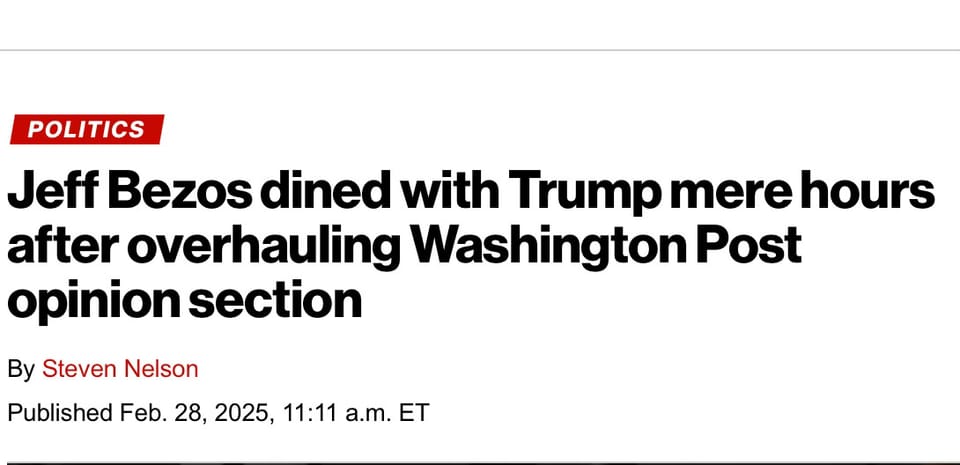
When megalomaniacal billionaire and Washington Post owner Jeff Bezos announced this week that the paper’s opinion section would “be writing every day in support and defense of two pillars: personal liberties and free markets” and “viewpoints opposing those pillars will be left to be published by others,” it was widely recognized as a Very Bad Thing: a threat to narrow the range of viewpoints presented in the paper and a statement of principles so vague and abstract they can only be taken as window-dressing for a hard-right agenda.
As Washington Post columnist Dana Milbank observed, “In its plain language, this is unobjectionable. Personal liberties and free markets are part of the American creed. But many readers I’ve heard from suspect the words are cover for a plan to turn this into a MAGA-friendly outlet.” Readers have good reason for their suspicions: If the change was really so “unobjectionable” there would be no need to make the announcement. Bezos, after all, is not in the habit of announcing editorial policy at The Washington Post. David Shipley, the Post’s outgoing Opinion editor, would not likely resigned in protest from one of the most prestigious jobs in all of journalism — just after buying a new home in Washington, DC that he will now not move into — had Bezos’s mandate been as “unobjectionable” as the billionaire tried to make it sound.1
What Jeff Bezos quite clearly means by “personal liberties and free markets” is that rich people like Jeff Bezos and really big companies like the ones he owns should be able to do pretty much whatever they want, preferably while enjoying advantages bestowed upon them by the government.2
Relatedly, Washington Post owner and “free market” advocate Jeff Bezos is an extraordinarily rich man in part because Amazon and its subsidies have enjoyed more than $11 billion in state and local government subsidies.
Now, I’m sure you can come up with some twisted rationalization for why a monopolyish3 company with $600 billion in annual revenue not having to pay taxes while the companies trying to compete with it do have to pay taxes is consistent with “free market” principles, but my advice is: keep it to yourself. Nobody’s buying it.4
A 2024 Washington Post article about Bezos’s increased interest in securing government funding for his businesses, particularly Amazon and Blue Origin, portrayed Bezos as turning his attention to the federal government, and obsessively competitive with Elon Musk for government largesse:

Trump’s election in 2016 happened to coincide with a shift at Blue Origin, said a former employee, away from Bezos being willing simply to invest his own money and toward him “expecting that the government is going to fund a lot of these things.”
[…]
During a Saturday meeting at Blue Origin’s headquarters in May 2016, Bezos was frustrated that SpaceX had won a $33 million Pentagon contract for the development of its next-generation Raptor engine, according to two people familiar with the discussions.
“Elon’s real superpower is getting government money,” Bezos said, according to the people. “From now on, we go after everything that SpaceX bids on.”
[…]
A recent guest on Bezos’s yacht told associates there was “non-stop conversation about Elon” and his ambitions in space among Bezos and those in attendance, according to a person told about the conversations.
On Wednesday of this week — the very same day Bezos announced the Post’s new Opinion-section focus on “free markets” — the Washington Post ran a lengthy analysis of Elon Musk’s reliance on the government funding Jeff Bezos so eagerly seeks:

Is it just a coincidence that the Post news department ran this story about its owner’s primary business rival and competitor for government contracts? Maybe! It’s a good article about an important topic. Is there at least a whiff of hypocrisy in the world’s third-richest man announcing that his newspaper will publish only pro-free-market views while his other companies doggedly seek billions of dollars in government subsidies, tax breaks, and contracts? Absolutely!
Speaking of the Post’s news side: Criticism of Bezos’s changes to the paper’s Opinion section was immediately and predictably met with qualifiers and pushback from people — mostly but not exclusively journalists — who insisted that Bezos’s edict applied only to the Opinion section and that the Post’s news side would remain an invaluable bulwark against Democracy dying in darkness, as the paper’s self-important slogan puts it.
Even more predictably, those protests aged quite poorly.
On Friday, Donald Trump and JD Vance hosted Ukrainian president Volodymyr Zelensky in the Oval Office, where they “subjected him to a tirade of withering and infantilizing abuse in the Oval Office” that led the European Union’s top diplomat to declare “Today, it became clear that the free world needs a new leader.” Trump’s belligerent and dishonest approach to Zelensky and praise for Russia, led several European nations to swiftly reiterate their support for Ukraine5 and Liz Cheney to note: “Generations of American patriots, from our revolution onward, have fought for the principles Zelenskyy is risking his life to defend. But today, Donald Trump and JD Vance attacked Zelenskyy and pressured him to surrender the freedom of his people to the KGB war criminal who invaded Ukraine. History will remember this day— when an American President and Vice President abandoned all we stand for.”
Here’s how the Washington Post’s venerated news section covered the meeting on the front page of the paper’s website:
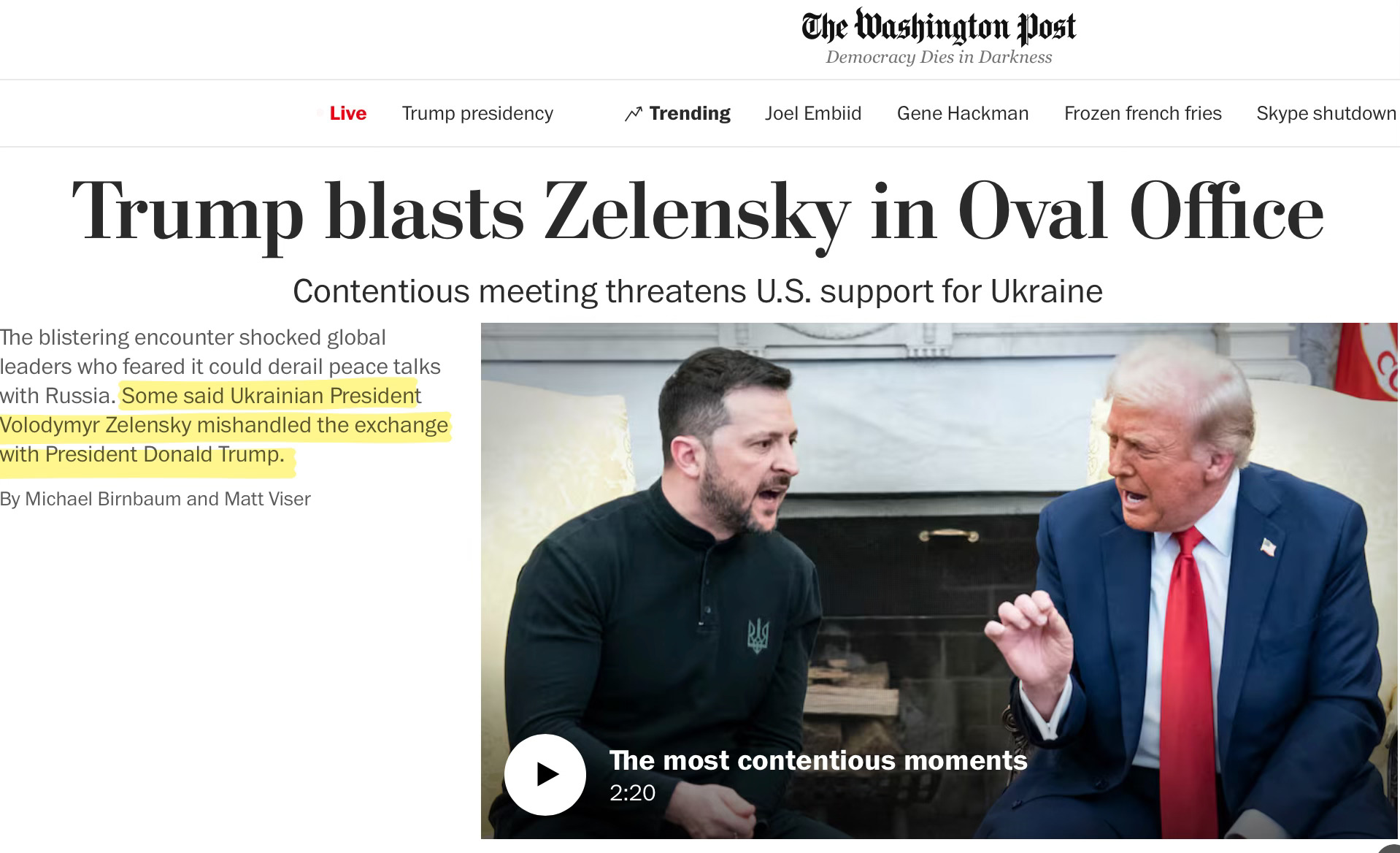
Not a word suggesting Trump had done anything wrong — but plenty of blame for Zelensky.
That’s a pretty big test the Post just failed. Not its opinion section — the news side, in an article co-written by the paper’s White House Bureau Chief, Matt Viser, who earlier embraced Trump’s description of the meeting as “great television,” because this is all a damn game to these people.
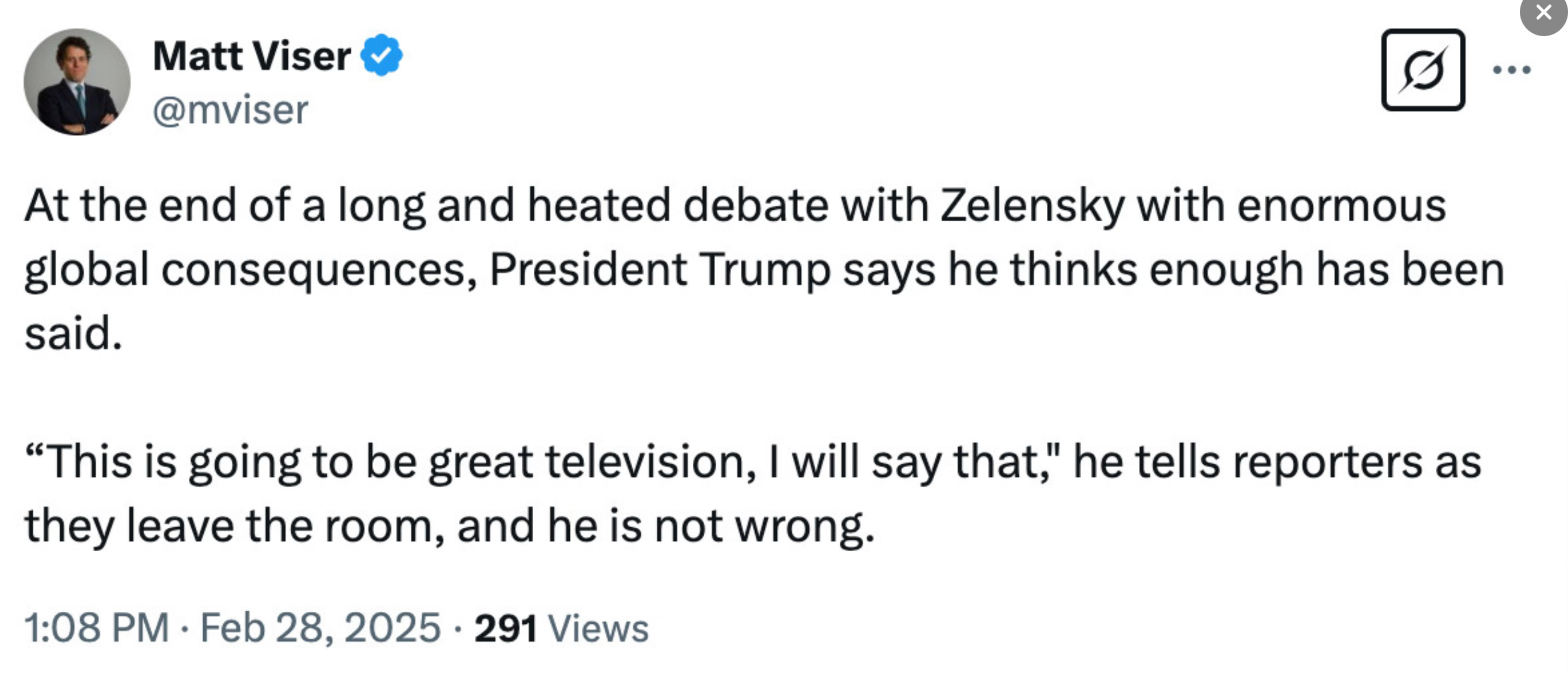
Is this the result of direct intervention from Jeff Bezos? Almost certainly not. The Post reporters and editors who have insisted Bezos has never directly intervened in their news coverage are presumably telling the truth. But it’s a narrow truth. Bezos’s increasingly right-wing agenda cannot have gone unnoticed by the people whose paychecks he signs, and though journalists have long insisted that cannot possibly have any effect, conscious or subconscious, on the way reporters and editors do their jobs, pretty much everything we know about human behavior tells us it does.
It’s certainly possible, though, that the Post would’ve covered this meeting exactly like this if Bezos had never purchased the paper. Like the New York Times, The Washington Post is a very large company that employs a lot of very good journalists — and, like the New York Times, The Washington Post has been doing big things badly for a very long time, much longer than Bezos has owned the paper. The Post carried water for Ken Starr, waged war against Gore, helped George W. Bush lie America into war, and paved the way for Donald Trump.
Jeff Bezos might not have caused this, but does anyone really think he’s going to fix it? Of course not. It’s all downhill from here, for at least as long as Bezos owns the paper.
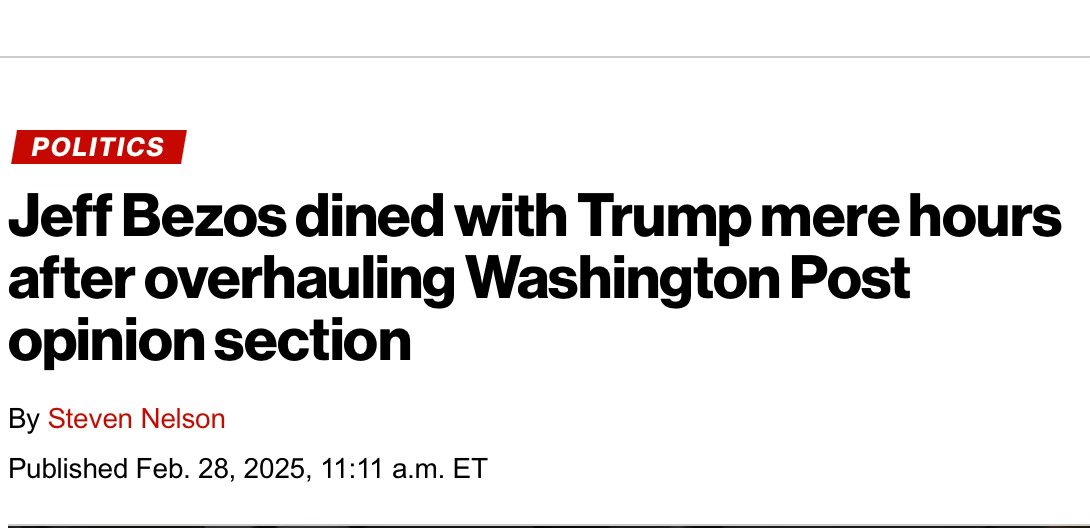
The people who last fall were surprised and dismayed that Bezos spiked the Post’s endorsement of Kamala Harris but lectured readers not to cancel their subscriptions over an isolated event were once again surprised and dismayed when the Post spiked an editorial cartoon critical of Bezos but still insisted readers have an obligation to support this essential journalistic institution only to be surprised and dismayed when the Post endorsed Trump cabinet nominees it had previously said “spread treacherous disinformation,” “sabotage democracy,” and “parrot false claims about fraud.” This week they were surprised and dismayed about Bezos’s Opinion Section edict but insistent that the news section is invaluable. Today I’m sure they were surprised and dismayed to see the Post’s news section propagandize on Trump’s behalf. They will continue being surprised and dismayed when the next thing happens, and the next — and keep finding reasons to insist it isn’t that bad, don’t cancel your subscriptions, we need the Washington Post.
I am not telling you to cancel your subscription. The Post produces a lot of good journalism alongside the bad, and a lot of people find value in that. I subscribe to the Post for professional reasons, I will continue to do so, and I will continue to benefit from some quality journalism and be infuriated by some inexcusable failures.
What I am telling you is: The latest outrage is not an isolated one, it will not get better, and no matter what the continually shocked-and-dismayed, we do not “need” The Washington Post.
We need something the Post is not, probably has never been, and definitely will not be any time soon. We need well-resourced, authoritative, independent news outlets that take their jobs seriously; that consistently tell readers true things in proportion to their importance; that treat false equivalence like the lie that it is; that understand that politics and government are not a fucking game and they are not entertainment; they are matters of life and death and health and prosperity and human freedom and dignity. That do all of this relentlessly. Not perfectly — perfect is impossible — but relentlessly, with an understanding that when they fall short it is a problem to be fixed.6
That’s what we need, but we are not getting it from The Washington Post and we are not going to.
Your Washington Post subscription dollars are not going to be the difference between democracy living or Dying in Darkness — just look at the Post’s recent track record. Or consider basic math. Jeff Bezos has somewhere in the neighborhood of a quarter-trillion dollars to his name; The Washington Post took in $175 million in advertising revenue alone last year. Your $40 digital subscription is equal to 0.0000004 percent of the paper’s 2024 operating losses. It is utterly inconsequential to the Post’s bottom line. Neither cancelling nor continuing your subscription will either fund or bankrupt essential journalism. Oh, hell, I’ll just quote myself from last December:
The New York Times, the Washington Post, The Los Angeles Times, and other news outlets like them employ a lot of good journalists who do good, essential work. They also employ a lot of very bad journalists who do absolutely dismal work and have played a central role in America sliding towards fascism. However you assess the proportion of good and bad work that they do, there’s this: These are huge companies owned and controlled by very wealthy people. The New York Times Company all by itself enjoyed $2.4 billion in revenue in 2023. Your subscription dollars are not even a drop in the bucket to them. Subscribing to The New York Times or Washington Post in order to “support journalism” is like giving Harvard fifty bucks to “support education.”
If you want to “support journalism,” smaller outlets are the better way to go: The marginal value to the New York Times of a subscription ($125 to a company with $2.4 billion in revenue) is a heck of a lot less than the marginal value of a subscription to, say, Mother Jones ($19.95 subscription to a company with $16.5 million in revenue.) And of course your subscription dollars mean even more to individual, independent journalists and writers.
Mother Jones, DAME, The New Republic, your favorite newsletters — there are countless small outlets and independent journalists doing essential work on shoestring budgets for whom 40 bucks is meaningful. If you want to support journalism, subscribe to them. Subscribe to the Washington Post, too, if you want to — just don’t let anyone guilt you into it, or convince you the paper’s flaws are isolated to the Opinion section.
To be clear: Milbank might have pulled his punch a bit but he was very clearly not defending Bezos. ↩
That’s what the folks who can’t stop going on about “free markets” pretty much always mean. If this strikes you as overly cynical I will just remind you that a lot of very sophisticated people are absolutely shocked that pretty much all of the nation’s most prominent “free market” Republicans are fully on board with overt authoritarianism. Think you can devise some dorm-room theoretical definition of “free markets” that really are thoroughly free in all dimensions? Cool. I don’t care. The purpose of the billions of dollars that has been spent promoting “free market” branding over the last several decades has been the consolidation of power by a handful of very rich people and very large corporations that do not give a damn about free markets or free anything else. ↩
I am not a lawyer and I am not an economist but c’mon we all know what we see, and so does the Federal Trade Commission — or at least it did before the Trump/Musk wrecking crew came to town ↩
Seriously, keep it to yourself. I have less than zero interest in dorm room philosophizing about “free markets.” I promise I have consumed more than enough right-wing (and “libertarian,” but I repeat myself) propaganda about “free markets” and am deeply aware of how not-actually-free they are. ↩
Trump role model Victor Orban loved his performance though. ↩
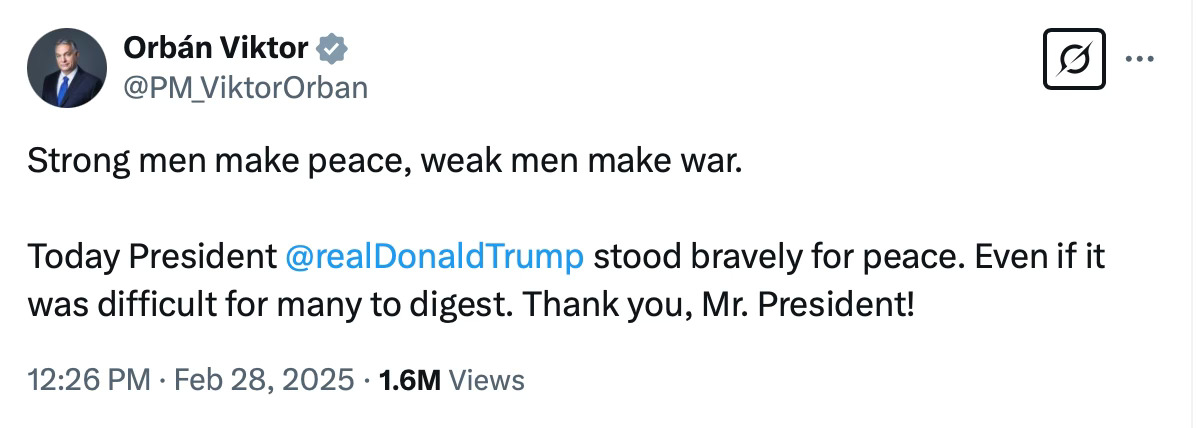
Change a few details and 100 percent of this newsletter applies to the New York Times as well. ↩
Member discussion